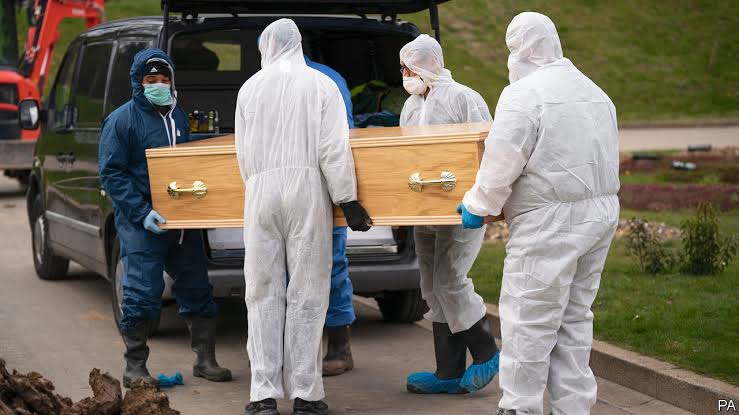COVID-19: Families Mourn Bodies That Will Never Come Back Home
“Bad News! A call from my mum at 5 a.m. this Monday informed me of the death of my uncle. To all Cameroonians who think the virus is an illusion, I am advising you guys to stay at home. That is the only way out.”

That was a tweet by renowned Cameroonian footballer Patrick Mboma announcing the death of his uncle, Achille Essome Moukouri, on Monday, March 23, which informed Cameroonians of the first Covid-19 fatality in Cameroon.
That tweet generated so much controversy and set twitter, the social media outfit, on fire.
Within 24 hours after the Mboma announcement, the Director of Douala Laquintine Hospital where Mboma’s uncle died, Dr Njock Louis Richard, issued a statement denying that Moukouri died of Covid-19.
Njock declared that contrary to the footballer’s claim, his uncle died of complications from diabetes and a cardiac situation.
To compound the controversy surrounding the death, the medical authorities decided to bury the corpse less than 24 hours after the man died robbing the family of the opportunity to give their loved one a befitting burial in pure African tradition.
Following the hurried burial, the late man’s daughter, Kalinka Essome Moukouri, issued a statement insisting that her father died of Covid-19.
“My father, Achille Essome Moukouri, died this morning at 5:15 a.m., a victim of the coronavirus. …
“Dad, you were admitted to the hospital yesterday afternoon, you died this morning at 5:15 a.m. and you were buried the same day at 7:00 p.m.
“We weren’t even able to say goodbye to you with dignity because sanitary measures require it.”
After the statement, the Laquintine Hospital authorities were forced to backtrack on their first statement and confirmed that Moukouri was the first Covid-19 casualty in Cameroon.
This controversy over the death heralds the fact that not only has this pandemic suddenly turned national life upside down it is ploughing into traditional norms and practices reserved for loved ones and family members when they die.
Since the first death, several other deaths have been reported and the corpses buried the same way Moukouri was buried without following traditional ways of conducting burials.
Even the first medical doctor to die of the pandemic, Dr. Tchouamo Michel, was buried in similar manner.
Under normal circumstances, government’s decision to bury the dead without involving family members would spark off confrontations and sometimes violence.
But as Justice Ako Mbeng, a former Vice President of the Southwest Regional Court of Appeal in Buea, said, “…There are no legal provisions governing the conduct of burials in the country.
“That said, common sense would dictate that traditional burial norms should not be given priority over the safety of the community.
“So instead of a dead individual provoking the deaths of others, the one better goes alone. When somebody is dead, the one is dead, period.”
The enormity and spread of the coronavirus and its rising death toll has forced even the most ardent traditional advocates to see reason in the government actions.
According to Chief Asah Jefferson, a traditional ruler from Menchum Division in the Northwest Region where tradition reigns supreme, “We are being obliged to go along with government in its actions.
“When there is a national emergency like this one, the decent thing to do is to put tradition on leave for the period of the emergency.
“But in having to bend our traditions in order to meet with the exigencies of an unprecedented deadly health situation, government should at least associate the families of the dead in the burial process.
“The corpses of our people don’t belong to government so we should be allowed to bury them ourselves, albeit, obeying the prescriptions of the medical authorities.
“Government’s forceful attitude towards the burials makes some families to start asking questions as to whether government has ulterior motives behind its actions.”
Chief Gabriel Ebanja, a paramount ruler of the Balongs, who himself is a Nigeria-trained medical doctor and Director of Ebanja Clinics, said “…there is nothing medically wrong with government doing the burials.
“Because someone died does not mean all others, including family members should also die.”
Ebanja noted that “…even the Pope has instructed priests to avoid group church services in order to save church goers from the Covid-19 and its inherent death.”
However, opponents of the government’s actions believe the people are accepting the arrangement out of fear.
“Let nobody deceive you that the relative tolerance by the people of the heavy-handedness of government concerning the burial of their loved ones who died from Covid-19 is genuine.
“No! The people are tired of being killed by security forces supposed to protect them so their being quiet is out of fear.
“Under normal circumstances and if they were living in countries where there is the rule of law, things should have exploded,” declared Daniel Nkwano Simo, a political activist and member of Cameroon’s leading opposition party, Social Democratic Front.
Support Our Journalism
There are millions of ordinary people affected by conflict in Africa whose stories are missing in the mainstream media. HumAngle is determined to tell those challenging and under-reported stories, hoping that the people impacted by these conflicts will find the safety and security they deserve.
To ensure that we continue to provide public service coverage, we have a small favour to ask you. We want you to be part of our journalistic endeavour by contributing a token to us.
Your donation will further promote a robust, free, and independent media.
Donate HereStay Closer To The Stories That Matter




